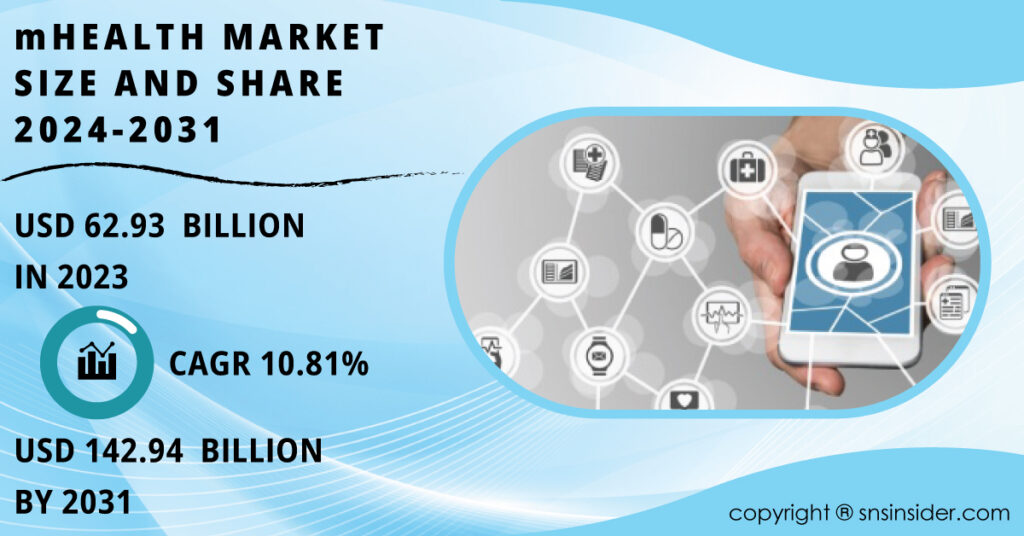
The mHealth market is experiencing an intense rise, transforming the way healthcare is delivered and managed. mHealth includes a diverse range of mobile technologies used for healthcare purposes, including applications (apps), wearable devices, remote patient monitoring tools, and telemedicine platforms. According to SNS Insider the market is estimated to grow at a CAGR of 10.81% over the forecast period of 2024-2031, and the valuation for the year 2031 will be USD 142.94 billion.

Market Scope:
The mHealth market, includes mobile devices and technologies for healthcare, is experiencing explosive growth. Fueled by the near-ubiquitous presence of smartphones and increasing health consciousness, mHealth offers a treasure trove of possibilities. From fitness trackers monitoring daily steps to apps reminding users to take medication, mHealth empowers individuals to take charge of their well-being. Furthermore, mHealth facilitates remote patient monitoring, allowing healthcare providers to keep tabs on chronic conditions and intervene as needed. This patient-centric approach, coupled with the convenience and affordability of mobile technology, is promoting the mHealth market towards a bright future.
Download Free Sample Report of mHealth Market @ https://www.snsinsider.com/sample-request/3521
List of mHealth Companies Profiled in Report:
- AT &T
- Telefonica
- SoftServe
- Samsung Electronics
- Apple
- Orange
- mQure
- Qualcomm Technologies
- Vodafone Group
Key Insights:
Growing Demand for Remote Healthcare: The COVID-19 pandemic significantly accelerated the adoption of telehealth and remote patient monitoring. Patients and healthcare providers alike discovered the convenience and efficacy of virtual consultations and remote data collection. This trend is expected to continue, fueling the demand for mHealth solutions.
Increased Smartphone Penetration: The ubiquitous presence of smartphones has created a fertile ground for mHealth solutions. With millions already possessing these powerful devices, the barrier to entry for mHealth apps is significantly lower compared to traditional healthcare technology.
Technological Advancements: The continuous innovation in wearables, sensors, artificial intelligence (AI), and big data analytics is promoting the mHealth market forward. Wearables are becoming increasingly sophisticated, capturing a wider range of health data with greater accuracy. AI-powered algorithms are being integrated into mHealth solutions to personalize user experiences, identify potential health risks, and provide real-time health insights.
mHealth Industry Segmentation as Follows:
By Component
- Wearables
- mHealth Apps
By Participants
- Mobile Participants
- Device vendors
- Content Players
- Healthcare Providers
By Services
- Monitoring Services
- Diagnosis Services
- Healthcare Systems
- Others
By component segment Analysis:
The mHealth market thrives on two key components: wearable devices and mobile health applications. While mHealth apps currently hold the larger market share, exceeding 50% in 2023, wearables are experiencing the faster growth rate. Advancements in sensor technology allow wearables to capture a wider range of health data, making them more versatile for various health goals. The increasing popularity of smartwatches and fitness trackers with built-in mHealth app integrations creates a seamless user experience. This synergy between wearables and mHealth apps is expected to continue driving the overall mHealth market forward.
Have Any Query? Ask Our Experts @ https://www.snsinsider.com/enquiry/3521
Regional Analysis:
North America currently holds the largest market share in the mHealth sector due to the high smartphone penetration, well-established healthcare infrastructure, and government support for telehealth initiatives. However, the Asia Pacific region is expected to witness the fastest growth rate in the coming years. This can be attributed to the expanding smartphone user base, increasing disposable incomes, and growing awareness of mHealth solutions.
Recent Developments:
Apple continues to dominate the wearable market with its Apple Watch, integrating advanced health monitoring features.
Fitbit, known for its fitness trackers, has expanded its offerings to include sleep monitoring and stress management tools. Well-known pharmaceutical companies like Pfizer and Novartis are also venturing into the mHealth space by developing medication adherence apps and patient engagement platforms.
Telemedicine giants like Teladoc Health and Amwell are experiencing significant growth as they cater to the rising demand for virtual consultations.
Key Takeaways:
The mHealth market is filled with potential, poised to revolutionize healthcare delivery and empower individuals to take charge of their well-being.
As technology continues to evolve and healthcare needs transform, the mHealth market is expected to witness sustained growth, offering exciting opportunities for innovative companies and improved health outcomes for patients worldwide.
Purchase mHealth Market Report @ https://www.snsinsider.com/checkout/3521
Contact Us:
Akash Anand – Head of Business Development & Strategy,
Phone: +1-415-230-0044 (US) | +91-7798602273 (IND),
Website: https://www.snsinsider.com/
Information contained on this page is provided by an independent third-party content provider. Binary News Network and this Site make no warranties or representations in connection therewith. If you are affiliated with this page and would like it removed please contact [email protected]



Comments